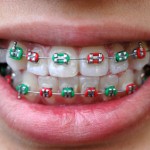
Good patient compliance is important for successful outcomes in orthodontic treatment with care and maintenance of both the orthodontic appliance and oral hygiene being important.
The aim of this study was to determine whether presenting audiovisual information through YouTube (Google, San Bruno, Calif) to orthodontic patients undergoing fixed appliance treatment results in improvements in the knowledge related to appropriate care of the teeth and appliances during treatment.
Methods
Patients aged 13 and over attending the Eastman Dental Hospital, London, for fixed appliance treatment were randomised to either treatment of control group. Both groups were given routine verbal and written patient information related to fixed appliances, and the participants in the intervention group were sent 3 e-mails over 6 weeks requesting that they view a 6-minute YouTube video containing similar information but in audiovisual format. Questionnaires were used to assess patient knowledge at baseline and at 6-8 weeks.
Results
- 67 patients were randomised (34 -control group; 33-intervention group).
- 60 patients completed both questionnaires.
- Participants viewed the video 90 times during the study time frame.
- Patients in the intervention group scored, on average, almost 1 point higher on the second questionnaire than did those in the control group (95% CI for the difference, 0.305-1.602; P= 0.005).
- Ethnicity had a statistically significant effect on improvement in knowledge, but sex did not.
- No harm to any patient was noted during the trial.
Conclusions
The authors concluded:
It appears that presenting audiovisual information through the YouTube site to orthodontic patients undergoing fixed appliance orthodontic treatment does, on average, result in an improvement in knowledge related to care of the dentition and the appliances when compared with standard methods of providing information.
Comments
This interesting study demonstrated improvements in knowledge in both groups over the period of the study although the change was greater in the intervention group. The study has only focused on change in knowledge and it would have been interesting to see if there had been any impact on clinical parameters. The authors themselves recommend future studies to assess a range of clinical outcomes including basic periodontal examination score, oral hygiene index score, appliance breakage.
While there was some testing of the questionnaire to assist in the estimation of sample size, whether or not the questions were validated is not indicated. The authors also highlight that the limited number of questions used (15) may have impacted on the ability to reflect knowledge differences between the groups. It is recommended that health promotion intervention design and testing should have a theoretical basis. While this trial does demonstrate some benefit the future role of social networks in promoting health needs further examination. A recently published narrative review (Balatsoukas et al ) suggested that:-
More research is needed in this area to understand the actual effect of social network technologies on health promotion. More RCTs of greater length need to be conducted taking into account contextual factors such as patient characteristics and types of a social network technology. Also, more evidence is needed regarding the actual usability of online social networking and how different interface design elements may help or hinder behavior change and engagement. Moreover, it is crucial to investigate further the effect of theory on the effectiveness of this type of technology for health promotion. Research is needed linking theoretical grounding with observation and analysis of health promotion in online networks.
Links
Primary paper
Al-Silwadi FM, Gill DS, Petrie A, Cunningham SJ. Effect of social media in improving knowledge among patients having fixed appliance orthodontic treatment: A single-center randomized controlled trial. Am J Orthod Dentofacial Orthop. 2015 Aug;148(2):231-7. doi: 10.1016/j.ajodo.2015.03.029. PubMed PMID: 26232831.
Other references
Balatsoukas P, Kennedy CM, Buchan I, Powell J, Ainsworth J. The Role of Social Network Technologies in Online Health Promotion: A Narrative Review of Theoretical and Empirical Factors Influencing Intervention Effectiveness. J Med Internet Res. 2015 Jun 11;17(6):e141. doi: 10.2196/jmir.3662. PubMed PMID: 26068087; PubMed Central PMCID: PMC4526933.

Social media and care of orthodontic appliances https://t.co/yOC7uvVfEh
Social media and care of orthodontic appliances https://t.co/wrqCTNhLMJ
Providing information to orthodontic patients using YouTube improved knowledge https://t.co/wrqCTNhLMJ
YouTube information provision improved care of orthodontic appliance knowledge https://t.co/wrqCTNhLMJ
Giving orthodontic treatment information with YouTube improved knowledge https://t.co/wrqCTNhLMJ
Don’t miss- Social media and care of orthodontic appliances https://t.co/wrqCTNhLMJ
RT @edrneelesh: Social media and care of orthodontic appliances: The Dental Elf https://t.co/1LoKAIXU1E #hcsm
#Socialmedia and care of orthodontic appliances https://t.co/ywuuo79vii #orthodontist